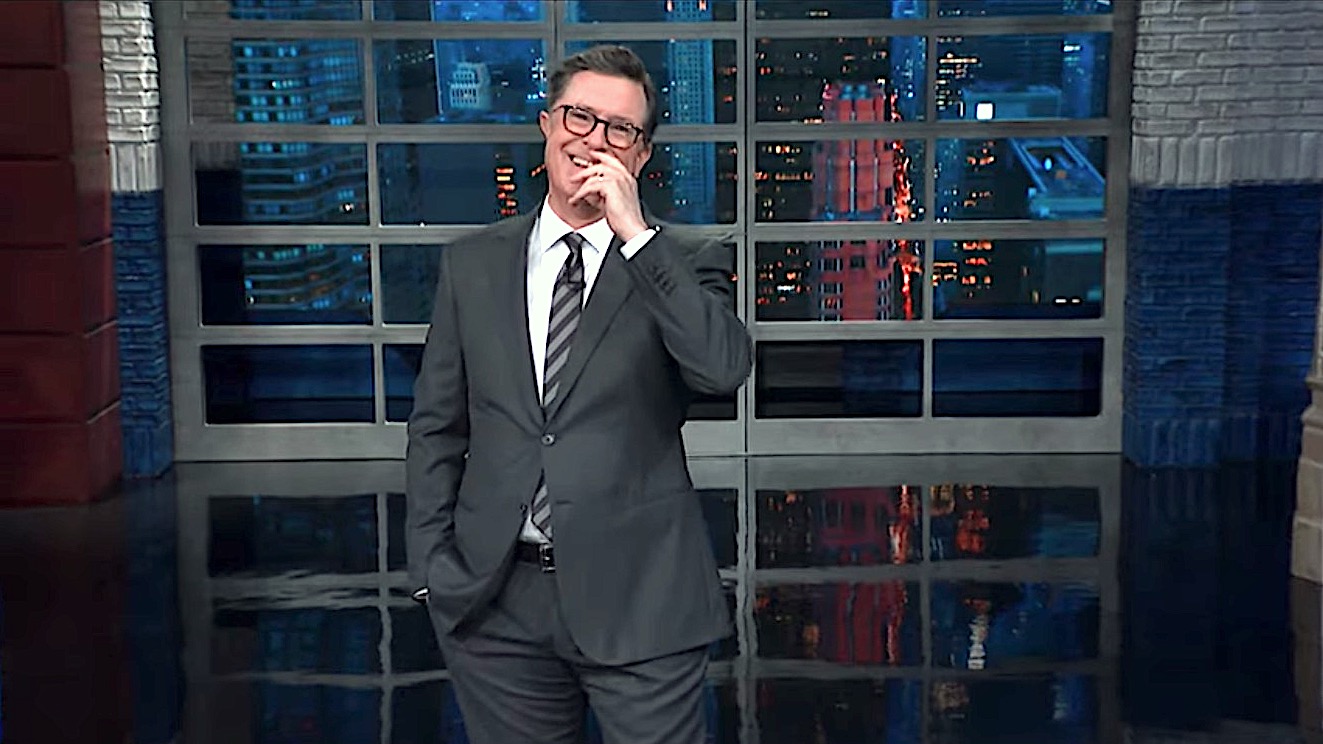Stephen Colbert doesn't think Trump is winning his China trade war, but he knows who's losing


A free daily email with the biggest news stories of the day – and the best features from TheWeek.com
You are now subscribed
Your newsletter sign-up was successful
"Remember during the campaign in 2016 when the president said we're going to win so much we'd get tired of winning?" Stephen Colbert reminisced on Monday's Late Show. "Wall Street got there first." The stock markets dropped sharply Monday in response to the breakdown of China-U.S. trade talks. Colbert explained that negotiations derailed last week after China wouldn't commit to changing its laws and said it didn't want the deal's details released, just a summary. "Oh, really?" he said. "The White House is upset because China wants to release a summary?"
Colbert mocked Trump's "love collecting BIG TARIFFS" tweet with an homage to Sir Mix-a-Lot's "Baby Got Back." "The president thinks he can outlast the Chinese because he sees tariffs as free money," Colbert said. "But — and, spoiler — Trump is lying" that China pays for the tariffs, as Chris Wallace got White House economic adviser Larry Kudlow to admit, eventually, on Fox News Sunday. Colbert put Kudlow's first gambit in perspective: "Yes, technically, one side pays the price, but both sides suffer. It's a bold marketing strategy. It reminds me of the ad campaign: 'Taco Bell: Everyone Will Suffer.'"
"Wallace continued to drag Kudlow kicking and screaming into reality," but Kudlow put up a struggle, asking if they could use "trade negotiation" instead of "trade war." No, Colbert answered. "I know why you want to change it, because it makes it seem less dangerous. There's a reason no one went to see Avengers: Infinity Negotiation."
The Week
Escape your echo chamber. Get the facts behind the news, plus analysis from multiple perspectives.

Sign up for The Week's Free Newsletters
From our morning news briefing to a weekly Good News Newsletter, get the best of The Week delivered directly to your inbox.
From our morning news briefing to a weekly Good News Newsletter, get the best of The Week delivered directly to your inbox.
China retaliated Monday by raising tariffs on $60 billion of U.S. goods, mostly hurting U.S. farmers. Meanwhile, Trump's tariffs on Chinese goods will raise prices for U.S. consumers on items such as dog callers, apparel made from reptile leather, mattress supports, and Christmas lights. "That's really going to hurt the holiday-themed sex dungeon industry," Colbert joked, with visual mockup. "And you know, thanks to Trump, we were finally moaning Merry Christmas again." Peter Weber
A free daily email with the biggest news stories of the day – and the best features from TheWeek.com
Peter has worked as a news and culture writer and editor at The Week since the site's launch in 2008. He covers politics, world affairs, religion and cultural currents. His journalism career began as a copy editor at a financial newswire and has included editorial positions at The New York Times Magazine, Facts on File, and Oregon State University.
-
 Quiz of The Week: 14 – 20 February
Quiz of The Week: 14 – 20 FebruaryQuiz Have you been paying attention to The Week’s news?
-
 The Week Unwrapped: Do the Freemasons have too much sway in the police force?
The Week Unwrapped: Do the Freemasons have too much sway in the police force?Podcast Plus, what does the growing popularity of prediction markets mean for the future? And why are UK film and TV workers struggling?
-
 Properties of the week: pretty thatched cottages
Properties of the week: pretty thatched cottagesThe Week Recommends Featuring homes in West Sussex, Dorset and Suffolk
-
 ‘One Battle After Another’ wins Critics Choice honors
‘One Battle After Another’ wins Critics Choice honorsSpeed Read Paul Thomas Anderson’s latest film, which stars Leonardo DiCaprio, won best picture at the 31st Critics Choice Awards
-
 A peek inside Europe’s luxury new sleeper bus
A peek inside Europe’s luxury new sleeper busThe Week Recommends Overnight service with stops across Switzerland and the Netherlands promises a comfortable no-fly adventure
-
 Son arrested over killing of Rob and Michele Reiner
Son arrested over killing of Rob and Michele ReinerSpeed Read Nick, the 32-year-old son of Hollywood director Rob Reiner, has been booked for the murder of his parents
-
 Rob Reiner, wife dead in ‘apparent homicide’
Rob Reiner, wife dead in ‘apparent homicide’speed read The Reiners, found in their Los Angeles home, ‘had injuries consistent with being stabbed’
-
 Hungary’s Krasznahorkai wins Nobel for literature
Hungary’s Krasznahorkai wins Nobel for literatureSpeed Read László Krasznahorkai is the author of acclaimed novels like ‘The Melancholy of Resistance’ and ‘Satantango’
-
 Primatologist Jane Goodall dies at 91
Primatologist Jane Goodall dies at 91Speed Read She rose to fame following her groundbreaking field research with chimpanzees
-
 Florida erases rainbow crosswalk at Pulse nightclub
Florida erases rainbow crosswalk at Pulse nightclubSpeed Read The colorful crosswalk was outside the former LGBTQ nightclub where 49 people were killed in a 2016 shooting
-
 Trump says Smithsonian too focused on slavery's ills
Trump says Smithsonian too focused on slavery's illsSpeed Read The president would prefer the museum to highlight 'success,' 'brightness' and 'the future'
